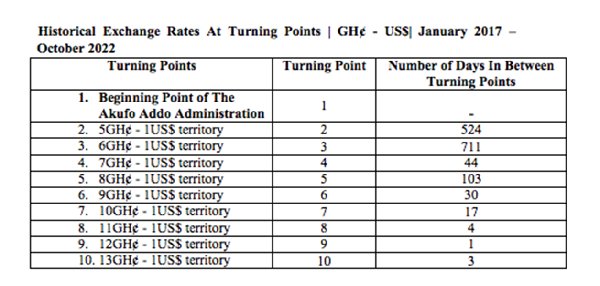
If fundamentals of economy are weak…
In the face of the recent sharp depreciation of the Ghanaian cedi (GH¢) to the US Dollar ($), I attempt to trace the trajectory of the exchange rate since the beginning of the Akufo-Addo administration.
Using data from the Bank of Ghana’s daily interbank exchange rate, I track the rate from January 9, 2017, through October 25, 2022.
I reckon that forex bureau and black-market rates differ. The buying rate at the first data point was GH¢4.21 and GH¢13.00 at the last data point.
Making sense of the data
What has been the patterns of movement in the exchange rate at the various turning points? By turning points, I simply mean points in time where the rate moved by the next threshold by GH¢1. The rate at the beginning of this administration was GH¢4.2 - US$1. I note a number of events during turning points. It is not a comprehensive list of all that happened, just my key highlights.
1. Beginning Point of The Akufo Addo Administration
The exchange rate enjoyed it longest period of relative stability between Turning Points 1 and 3 (January 2017 through February 2022). But during this period the COVID-19 pandemic hit resulting in (a) a partial lockdown of the economy from March 30 through April 23, 2020; (b) a two-phase easing of COVID restrictions between June 5 and August 3, 2020; (c) a reopening of the country’s main international airport to international travel, and (d) external financial support from institutions such as the International Monetary Fund (IMF).
During this period, Ghana experienced its first crediting rating agency downgrade in 2022 by Fitch on January 14 . One cannot forget the onset of the Russian-Ukraine war which began on February 24, 2022.The average rate was GH¢5.2 - US$1 during this period.
Between Turning Point 4 and 6 (March 2022 through September 2022), the number of days of relative stability declined significantly. It was during this period that government announced on July 1, 2022, that it was heading to the IMF for a bailout. During this period also, the government finally managed to pass The Electronic Levy (E-Levy) after four months of strong opposition in Parliament and public outcry. This impacted the government’s expected projected revenue from this new tax. The average exchange rate was GH¢7.7 - US$1 during this period.
The time between Turning Points 7 and 10 can be described as a period of instability with the rate of depreciation sharpening. During that period, the country experienced downgrades by credit rating agencies. In addition, domestic economic indicators such as the inflation rate continued to rise sharply. I often wondered if the government’s posture during this period was “let’s ride out the storm.” I saw no policy actions from the government, and I think it is fair to say that it was unclear how soon the IMF bailout will be secured. The average exchange rate was GH¢11.7 - US$1 during this period.
The future of exchange rate discussions
Several explanations have been offered to explain the current woes of the Ghanaian cedi. They have ranged from external factors (COVID-19; Russia-Ukraine War; lack of access to the international markets to borrow, etc.) to internal factors (government’s mismanagement of the economy, speculation, rush for the dollar, etc.). All of these may have a hand in our current woes.
Two things though are clear. First, there are structural issues with the Ghanaian economy. We have no control over external events and cannot predict when they will happen. We can only prepare well in advance. And that preparation will come from the tough policy choices we need to make.
Second, it is clear to me that given all the structural issues, I hope a day will come when political actors will be measured in the extent to which exchange rate depreciation is weaponised as a tool against opponents.
The issue of the exchange rate is more economics than politics, but it will take a different kind of political dialogue to fix the economics. Until then, I am sure people will keep reminding others of the statement “If the fundamentals of the economy are weak, the exchange rate will expose you”
The writer is a fellow of CDD-Ghana